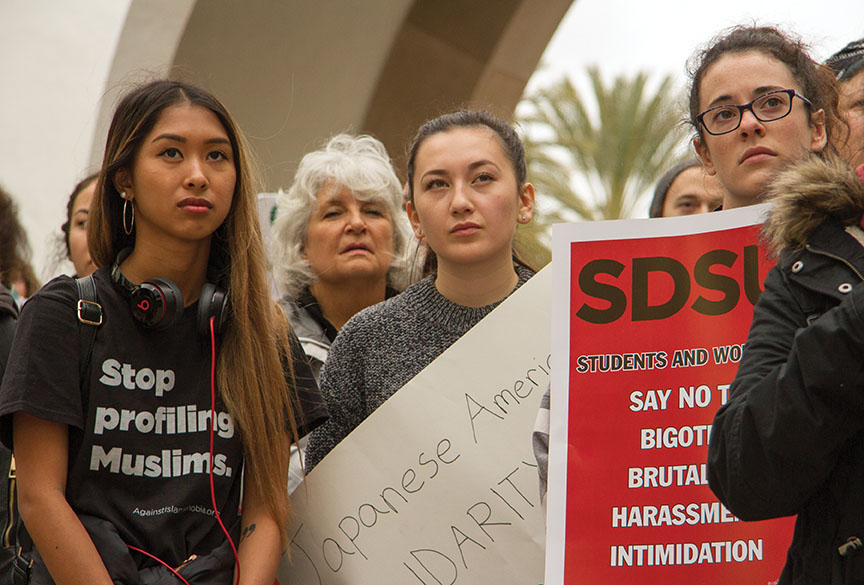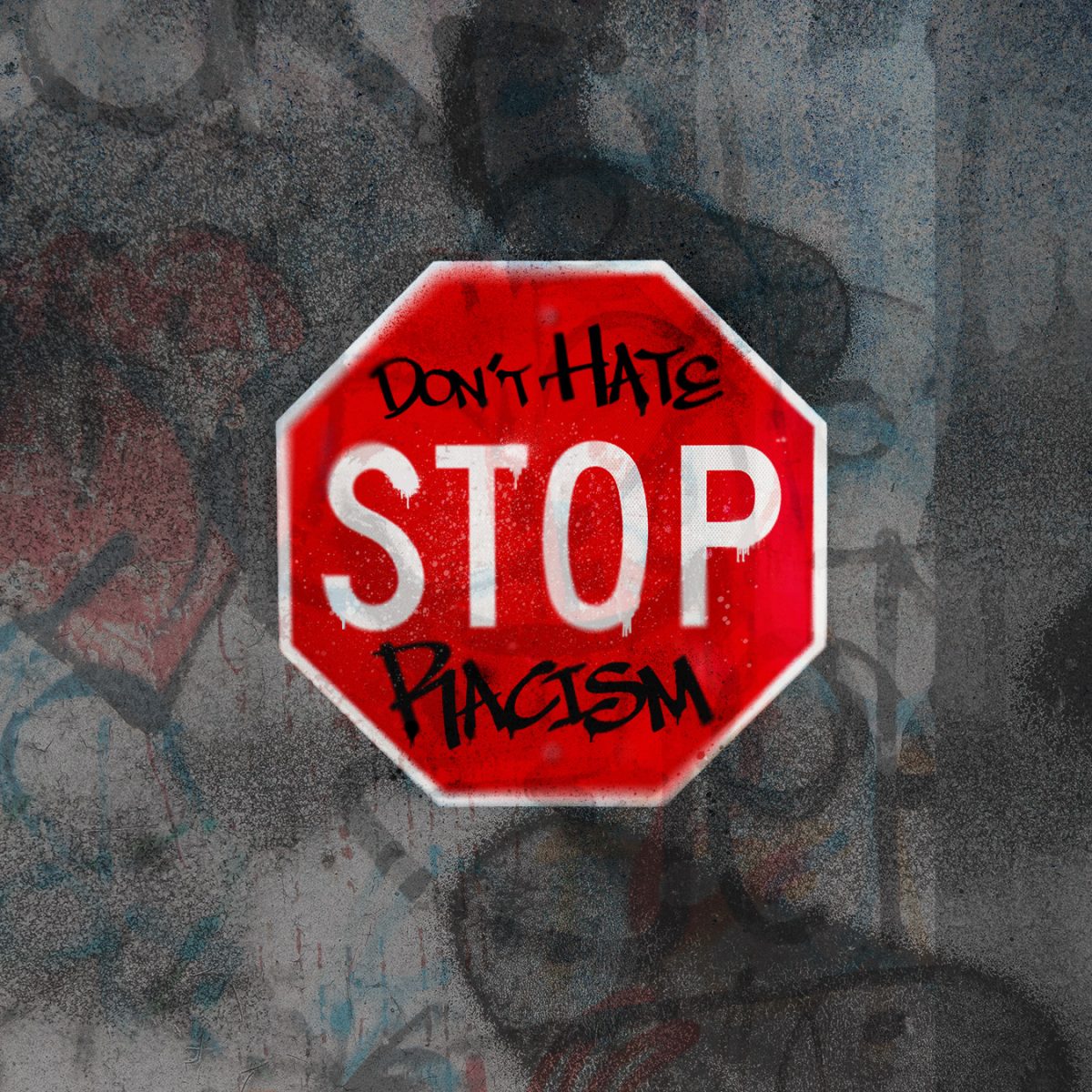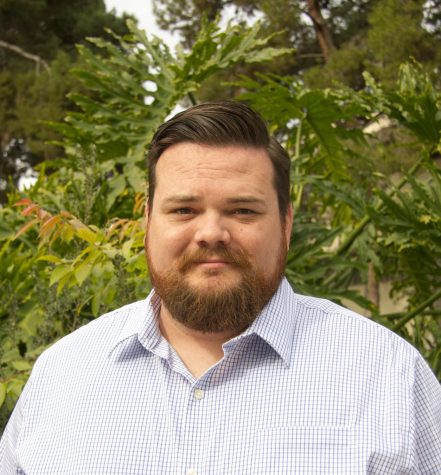Freddie Gonzalez, a Mexican-Muslim mechanical engineering senior, said he is heartbroken when he visits the mosque because he sees people who know their family members will not be able to share their dreams in the U.S.
A black Muslim psychology senior, who requested to be unnamed, said the immigration ban has affected her relationship with her Turkish-Muslim husband because he is scared he will not be able to see his family.
Layla Abdi, a Somali sociology junior, said she is scared her sister may have a problem bringing her husband from Somalia to the U.S. because he is Somali.
Forty students attended San Diego State with student visas from Iran, Iraq, Sudan, Syria, Yemen and Libya in Fall 2016. Zero from Somalia were reported.
Director of SDSU Media Relations Gina Jacobs said the data for international student citizenship for Spring 2017 is being evaluated and will be released next week.
“The number doesn’t necessarily encompass every single student that would be actually impacted,” Jacobs said.
The number of students could potentially be higher than 40.
These interviews were conducted between Feb. 7 and Feb. 13, during which many changes were made to the status of the ban against Muslim refugees entering the country.
A federal appeals court unanimously rejected a bid to reinstate President Trump’s travel ban on Feb. 9. because they said it did not advance national security.
Layla Abdi, Somali sociology junior
Q: How has the executive order affected your family?
A: We were scared. We had to let (my sister) know to come (to the U.S. as soon as possible.) Although she didn’t face any trouble or anything, if they start doing this, they will do more, and there’s a (possible Muslim) registration coming up which I hope doesn’t happen, but it affects everybody. I do have family who want to come here who will be affected in that way, but it does affect everybody because even if I want to go back to Somalia and see family or see someone who’s graduating or anything. I cannot go back, My sister is married right now, and if she wants to bring her husband here it will be a problem because he’s a Somali . So any Somali refugees cannot come here and it will affect us in that way too. It did affect my sister, and that’s my family so it affected me that way. She’s always checking on the news and everything.
Q: How did the executive order affect you as a student?
A: Trying to focus on school, and every day going back home and (having your) parents asking what happened today, and you have to update them with the news and they are scared. They are scared even, if you tell them,‘ oh you’re a citizen, it won’t affect you,’ they still think it will affect them in a way. It doesn’t matter if you are a citizen or not, they know other Somalis who are affected, and how many people are held in the airport that day. It’s affecting me as a student to focus on this issue at the same time as going to school. And sometimes you don’t even have to study; all you see is news all over the place, and it takes your brain onto another level.
Q: How has the executive order affected you as a Muslim?
A: As a Muslim person, it’s really overwhelming and you are scared. We can’t sign up for late classes; we can’t go to the gym in the middle of the night. You never know who’s going to show up when nobody’s there and maybe try to blame you, so you have to be careful.
Freddie Gonzalez, mechanical engineering senior, Mexican Muslim
Q: How has the executive order affected your family?
A: My family is not personally affected by the ban, but I do know that when I go to a mosque that’s where I kind of see that people are most damaged. I think it’s more the older generation of Muslims that are affected, like the parents and the fathers and the mothers because they see that they have family members that really can’t share their dream here. It’s very sad to me when I go to a mosque and see all my brothers and sisters that can’t get a feel to make a dream here because of our new president, and because of the way our government works.
Q: How does it feel to be Muslim and Mexican living in the United States?
A: Originally my parents are from Mexico so I kind of see both ways. It’s just my mother and me. My mother sees the way we are represented as a Mexican community. So it kind of affects me when I see her get sad from seeing all the media attention that Mexicans are getting. She also gets heartbroken when she sees that my community is being affected by the Muslim ban, so it’s kind of a hardship of both sides. My family is getting the worst because both sides of the stone are being affected, so it’s very hard for me. It’s very heartbreaking and it’s very personal too, hearing stories like that from my friends.
Arnelle Sambile, English and communication senior
Q: How has the executive order affected you as a student?
A: As a student, it’s very tiring considering all of the executive orders. I think a lot of us have been saying that white supremacy has existed and has been oppressive, but now with the executive orders, people can see it in action.
I think as students, we find ourselves being tired between student activists and also having to balance our student work. Now, especially with this, it underlies the importance of practicing self care so we can continue the work that we’re doing.
I think (the orders) have affected a lot of my friends. I work at the Center for Intercultural Relations so I see how it affects a lot of my Muslim friends. It’s a lot to take in.
Q: How do you feel about being at a protest that supports Muslims?
A: I hope that people continue the work that they’re doing because the work doesn’t end at the protest, there’s more work to be done after.
Linguistics graduate student, Iranian
Q: Was anyone in your family directly impacted by the executive order?
A: (My dad) was actually visiting for a funeral in Iran at this time. He was in the country, so for us as a family it affected us because we were worried like ‘Is he going to be pulled in secondary, is he going to be mistaken as having a green card, what is he going to do if he loses his passport out of all things because there’s no embassy in Iran, so what’s going to happen,’ and fear of how he was going to be treated.
He left before the executive order and came back (Jan. 27) so he just missed the whole thing, but my family was worried. Everyone kept saying, ‘well he’s a U.S. citizen,’ but what does that even mean anymore?
You’re in the airport and you don’t know what’s going to end up happening. My entire dad’s side of the family are all living in Iran right now.
Q: What is the process of getting a visa in Iran?
A lot of people don’t really understand for Iran specifically, there’s no embassy there, so in order for anybody to come to the U.S. you have to go to a U.S. Embassy in another country. Some go to Turkey and some go to other surrounding countries so they make an appointment there so that requires a flight out to Turkey, that requires an interview over there, (and) they might not get granted.
A lot of people were telling me like ‘well they can just fly once the ban is lifted, or after the 90 days or what not.’ Well, it’s not that easy to start the process all over again. We don’t know if they’re going to be able to come back over here with ease, and if they would even feel safe doing so.
I think what people don’t realize is this is not the first time Iranians were singled out. It’s interesting to go back in history to the American hostage crisis in Iran in the late ‘70s. My dad was telling me they came to the university in California with big busses and said ‘everyone who was in big busses, get on. They put them in a center, fingerprinted (them), and were asked to report all of their information. They wanted to report every movement.
This has a lot to do with the American-Iranian relations that haven’t been good for a while. A a lot of people don’t really understand the history, or even the political trends that are happening between these two countries, and it’s almost like another tipping point, another thing to just throw on top of everything that’s been going on.
A lot of people are like ‘well why are they still protesting? Everything’s done’ and it’s like well, a lot of these groups haven’t been able to voice themselves or have been hushed or have been too scared to.
For example, a lot of people who came here from Iran are in (a) country where they’re not able to protest. They’ve dealt with their rights being completely taken away from them, and now here they’re dealing with it so it’s trauma. It’s trauma again put on this community of people who are not free to protest in their country the way that we are.
A lot of these groups have not had a chance to have dialogue on a public stage and speak on all the issues that they’ve been dealing with and I think that’s what’s important here. They just want to be heard.
Whether or not my family will be able to come back, I mean hopefully. Right now everything is ok but it’s just the point that this is not the first time Iranians have been targeted at all.
Q: How has the executive order affected the Iranian-American community?
The community took a really big shock. I went to an Iranian restaurant recently and there was a look of fear on everybody’s faces, I mean maybe if not for themselves but somebody that they knew and you can’t just switch it overnight. The effects are still there, it’s trauma. It happened, it could happen, is it going to happen again?
What is my place here as an American? Am I truly American?
Q: How many people do you know who are affected by the executive order?
A: My dad came over here as a student in the ‘70’s so he’s the only person here, but a lot of close family friends that we know have family who comes back and forth constantly. They’re all on visitor visas or on green cards, so they don’t have their citizenship.
There’s a lot of family members that go back and forth. They’ll stay here for six months and go back for six months. A lot of people’s grandmothers or grandparents, aunts and uncles will come visit and they’ll go back. Every Persian family that I know has someone that is traveling back and forth, whether it’s in San Diego or in the LA region
Psychology neuroscience senior, Black Muslim
Q: How have you been impacted by the executive order?
A: My husband actually is from Turkey, and though Turkey is not on the list, he is Muslim and it can affect his green card status. Because he is a green card holder, he’s nervous to go back to his country and to return, and we have anxiety about it because he wants to go back and visit his family, but it’s like if he goes, what if he can’t return? It messes with the happiness of our marriage because it’s like he has me, but he wants to go see his family too.
As a middle-eastern man, and to have a beard here in America, there are constant stares, and then me wearing a hijab, it’s just like people are so nasty sometimes. Some people want to shout ‘ISIS!’ to me or call me a terrorist, and that’s just not the way to be. I feel like Trump’s ban is (allowing) people to feel like it’s ok to say these things. It’s like Donald Trump is saying ‘It’s ok’ to have these feelings against Muslims; we all have these feelings. But that’s not the reality, he has those feelings and he can’t project those onto others. This is a country of immigrants so we should really strive to be better as a country.
Q: How has the executive order impacted you as a student?
A: As a student, I feel like everyone’s eyes are on me more. I’m just me, but as I’m walking, I feel like I’m a representation of Islam. Because I’m visibly Muslim, people are watching everything I do as a reflection of Islam. I feel like it puts pressure on me to reflect Islam in a better way, but also it’s a nice thing because it can show people to not have misconceptions about Muslim people. Like, I’m an American citizen, I was born here. So everyone Muslim is not a refugee, is not a foreigner and that makes no difference. I live here, I’m from here and for people to shout ‘go back to my country,’ I’m from here anyways, but regardless you shouldn’t be saying that to people. Don’t be so quick to stereotype. There’s people here of all religions.
We can’t feel like this ok. This is not a normal thing to accept.
Immigrants really make this country great. If Donald Trump wants to make this country great again, the more people the better, because that’s more ideas, that’s more scientists, that’s more research, that’s more politicians or future people who can really lead something wonderful.













